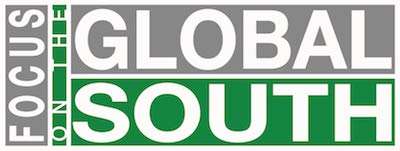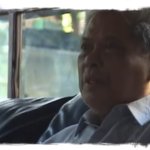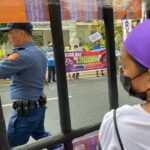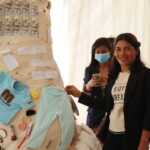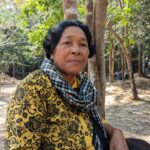The US-Venezuela confrontation surged to the forefront of the Meeting of Democracy-Promoting Foundations in Stockholm on August 28-30, 2005. In what many saw as a shocking display of unilateralism and arrogance, Carl Gershman, head of the US-government-funded National Endowment of Democracy (NED), ousted Eva Gollinger, a Venezuelan-American attorney, from a panel on the topic “Supporting Regime Change-Democratic Assistance or Intervention?”
Previously slated to speak, Gollinger was dropped a few days before the meeting owing to strong pressure on the Swedish organizing committee from the NED president. Gershman confirmed this during the panel when he said he objected to Gollinger’s presence at the panel because it would be “obscene” to have “somebody persecuting NGO’s” in the same panel with him. Gollinger brushed aside Gershman’s charges as wild allegations, saying that the real reason was that she was a strong critic of NED’s activities in Venezuela, which are aimed at destabilizing the government by “falsely painting the government of President Hugo Chavez as ‘undemocratic’ and ‘illegitimate.'”
“OUT OF CONTROL”
Many other delegates were appalled by Gershman’s action, which he angrily justified, almost shouting, during the panel. “Gershman was out of control,” observed one Northern European delegate who wished to remain anonymous. Another, a woman from Eastern Europe, said, “this is unacceptable behavior what he did to that girl-somebody saying I’m the Big Man and I get what I want.”
Gollinger nevertheless got a chance to speak from the floor during the question and answer session. She assailed Gershman for calling the Chavez government “semi-authoritarian” and implying it was illegitimate when it was, in fact, the “most democratic government Venezuelans have ever had. “Under Chavez, you’ve had 10 free and transparent electoral processes, three of them presidential, and in all of them Chavez won 60 per cent of the vote.” She called attention to the results of a recall referendum in 2004, which were certified as “honest and free” elections by the Carter Center and the Organization of American States. Gollinger also pointed to the “most democratic event in Venezuelan history-when ordinary Venezuelans went to the streets in April 2002 to demand that their president be reinstated after he was ousted by a military coup, and they succeeded.”
Unbalanced Panel
Gollinger’s absence from the regime change panel resulted in it being dominated by pro-interventionists. Abir Alsahani of the Iraqi Democratic Alliance argued that externally sponsored regime change to impose democracy overrode international law, in response to a comment from the floor by Walden Bello that there was no justification for such an action in international law. And when Bello raised the “appalling tragedy of 10,000 or more Iraqis being killed” by Anglo-American forces during and after the March 2003 invasion of Iraq, she responded, “I know that is terrible, but they would have been killed anyway by Saddam Hussein” had the invasion not occurred.
The controversy over the regime change panel overshadowed other conference proceedings, where progressive voices managed to get themselves heard.
In one panel Kondwani Chirambo of South Africa and Catherine Ndungo of Kenya explored the devastating impact of the HIV-Aids pandemic on democratic political systems throughout Subsaharan Africa.
In a panel on “Women in Political Decision-making,” Fereshteh Ahmadi, associate professor at Uppsala University in Sweden, presented a stimulating paper on the women’s struggle for political rights in contemporary Iran against the patriarchal clergy’s daily attempts to marginalize them from social and political life. She described the rise of an “Islamic feminism” which “attempts to constitute a new discourse on women, although on religious grounds, yet by working both from inside and outside the Islamic legal and theological sources.”
DEMOCRACY AND POVERTY
Participants in the opening panel addressed the question of the relationship of democracy to poverty. Cristina Girardi Lavin, an anthropologist from Chile, recounted lessons in participatory democracy in a small city near Santiago, where she had served as mayor.
Suzanne Jambo from Sudan and Halle Jorn Hansen from Norwegian People’s Aid focused on the challenges facing democratic processes in Southern Sudan, which will need to address not just political freedom but also development and poverty reduction.
In his presentation, Walden Bello called attention to the causes of what he described as “a palpable sense of disappointment that the new electoral democratic regimes have fallen far short of their promise of not only bringing freedom but also rolling back poverty and social inequality.” Bello traced this setback to two things: elite capture of democratic processes and structural adjustment programs imposed by external actors.
The essential dynamics of the formal democratic systems that have emerged since the 1980’s, said Bello, is that they allow “maximum factional competition among the elites while allowing them to close ranks against any change in the social and economic structures.” Already structurally opposed to economic democracy, this system was rendered even more anti-people and anti-developmental in its effects by the economic programs they were forced to impose on their populations by influential actors.
NEOLIBERAL ECONOMICS AND WOMEN’S EMPOWERMENT IN SOUTHEASTERN EUROPE
The analysis of democracy and women’s empowerment by Sonja Lokar of Slovenia paralleled that of Bello. According to Lokar, the “shock therapy” imposed on the new democracies in Eastern Europe in the 1990’s were so devastating that they served as the stimulus for the organizing of women’s movements throughout the region. “We did not organize mainly with the objective of being equal with men; we were forced to organize to deal with the terrible consequences of neoliberal economics.” Women’s organizations fought against cutbacks in women’s wages, maternity leaves, and childcare, and forced succeeding governments to retreat from the more extreme neoliberal policies. In the process, women were able to achieve significant advances in parliamentary representation-30 per cent in Kosovo, 26 per cent in Bulgaria, 22 per cent in Croatia, and 21 per cent in Macedonia.
Discussing methods of gender empowerment in Eastern Europe, Loskar attributed much of the success of the women’s movement to what she called a “sandwich strategy”-that is, “pushing our leaders from pressures from below while at the same time getting international agencies to pressure them from above on gender issues.”
In conclusion, an editorial comment. What did I think of the conference? It explored many vital issues, but the area I found most useful was the discussion of gender empowerment, especially the experiences from Southeastern Europe. Being a trade unionist, I would have liked more of the meeting to have been devoted to trade unionism and democracy promotion. But the overall impact of the meeting on me was one of disquiet. I found it disturbing that Carl Gershman could overturn the decision of the organizing committee and exclude Eva Gollinger. This was bully tactics of the worst kind.
There is a world of difference between organizations such as the Olof Palme International Center, which supports democratic practices in places like the Philippines out of solidarity, and outfits like Gershman’s National Endowment for Democracy, which promotes US government interests under the guise of spreading democracy. The NED and its practices are a disservice to democracy. The NED’s presence and behaviour at this meeting was a blot on the proceedings.
*Joshua Mata, who attended the three-day conference, is secretary general of the Alliance of Progressive Labor and a member of Akbayan!, the Citizens Action Party of the Philippines.
